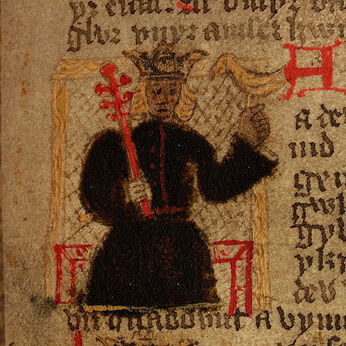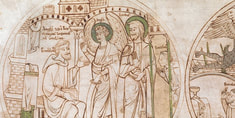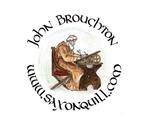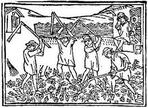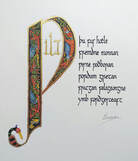|
A crude illustration from a 15th century Welsh language version of Geoffrey of Monmouth’s highly influential Historia Regum Britanniae The decision to write a trilogy set in the so-called Dark Ages was always going to be complicated. I should know as I’ve already written two of them set in Anglo-Saxon England. As if the task needed exasperating, I chose to write about ninth-century Wales. My interest was piqued by a simple curiosity. If the Vikings colonised Ireland, the Isle of Man, Scotland and England, why didn’t they manage to do the same in Wales? It is actually a fun question to answer because the question poses so many sub-questions. Finding an answer is complicated because the darkness of Dark Ages Wales is, choose your black metaphor here, darker than the rest because Wales was off the beaten track and as such, provides us with less written and archaeological testimony. Written? Let’s take for example, one of the main characters in my ongoing Book 1 of the trilogy, Rhodri the Great. Great? Well contemporaries didn’t give him that title. How reliable can it be if it was attached to his name more than 400 years later by a Welsh writer? It’s like saying that in 2422 a historian will decide to call Queen Elizabeth II, Elizabeth the Great. The difference is that my hypothetical historian, barring a cataclysm, will have a mass of material to draw on to back up his statement. Researching material about Rhodri, I discovered that apart from the skeletal facts regarding his reign, the richest source happens to be a Welsh historian from pre-1923 period: John Edward Lloyd MA. Subsequently, serious scholars have tended to lean on his work. Unless, of course, you consider the Annales Cambriae, a complex of Latin chronicles compiled or derived from diverse sources at St David’s in Dyfed, Wales. The earliest is a 12th-century presumed copy of a mid-10th-century original; later editions were compiled in the 13th century. So, that’s the minefield for me to tiptoe through and I’m not complaining because seeking some answers can be as enjoyable as it is frustrating. What about the sub-questions? Did the Vikings not colonise because Wales couldn’t provide fertile agricultural land? False. Wales contains within itself a similar variety of landscapes to what is found elsewhere in the British Isles. It contains mountains, hilly country, as well as low-lying ground more suitable for farming. Another thing Wales has in common with the other lands of the British Isles is miles and miles of coastline (1680 mile to be exact). The fact that there were no large tracts of Welsh soil conquered by the Vikings is not due to the unsuitability of the land. Evidence points to peaceful settlement and coexistence with the native Welsh. The Vikings came and plundered; we know that from contemporary Scandinavian written sources. The Norsemen called Wales Bretland: hence the provisional title for my trilogy – The Bretland Trilogy. They also established various place names in Wales, such as Haverfordwest, Swansea, and Anglesey, which were in the coastal or low-lying areas. So, we can say that the answer to my first sub-question is that they didn’t fail to colonise Wales because the farmland was unsuitable. Timber? The Vikings needed timber for their longships and to build their houses. During the early Middle Ages, Wales was rich in timber. There was much more forested land than there is now. So, that slams another door shut. What about slaves then? The Vikings were very active in a slave trade that spanned the breadth of Europe and influenced slave markets beyond. But the Welsh took an active part in this trade, supplying slaves for the Scandinavian middle men from their own hinterlands and from the lands of the Saxons. In southern Wales, Swansea and Cardiff provided markets for these deals. Another blind alley. What about lack of natural resources other than timber? Excavations at Dinas Emrys in north Wales and at Dinas Powys in the south indicate that blacksmiths worked in iron acquired from local ore. (Davies, Wales in the Early Middle Ages, 49). In addition to iron ore, there were also gold, copper, and lead mines in Wales. There was even a gold mine at Dolaucothi. Wales was not without mineral resources. They would have been attractive to the Vikings. So, there goes another possibility. The most glaring reason had to be geography. Look at a map of Europe. Put Wales in relation to Scandinavia and you see at once that it was inconvenient to the Vikings: out of the way. As Vikings from Denmark cross the North Sea, the first land they come to is England. If the raiders are coming from Norway then Scotland is closest. Coming from Norway and not stopping in Scotland, continuing around to the west, through the Hebrides, they come to Ireland before Wales. For the Danes who didn’t want to stop in England, they would have to sail through the English Channel. The rich monasteries of northern France would have proved alluring. The question of why the Vikings didn’t colonise Wales became so intriguing at this stage that I felt the answer had to lie in the Welsh people themselves. Could I write a historical novel about it? you bet! Not one, but three – I hope! Rhodri ap Merfyn, also known as Rhodri Mawr (the Great) came to be king of Gwynedd in the mid-ninth century. By the end of his reign, he ruled most of Wales through a combination of diplomatic marriage and conquest. He was a strong leader who was able to bring most of Wales into a united front against the Vikings. He scored a significant victory over the Vikings in 856. So, there’s Book 1 for me with the provisional title Rhodri’s Furies, but let me not get ahead of myself. After all, I’ve only written the first 35000 words and am about to start Chapter 11 as I write this. I have identified the main characters of Books 2 and 3, but as yet, there is no outline for either. In conclusion, isn’t it curious how concepts for novels can arise out of curiosity? Unanswered questions need answers. Mine is a search conducted by blundering around in the Dark Ages – by a man in a windowless cellar without a candle!  Get a free eBook!Join my newsletter & receive a free digital copy of Heaven in a Wildflower, book 1 of my St. Cuthbert Trilogy, as well as monthly news, insights, historical facts, & exclusive content delivered straight to your inbox! Thank you!You have successfully joined my mailing list!
0 Comments
Leave a Reply. |
To buy your copy of Rhodri's Furies click the link below:
https://www.amazon.co.uk/Rhodris-Furies-Ninth-century-Resistance-incursions-ebook/dp/B0BPX9C2D3/ |
